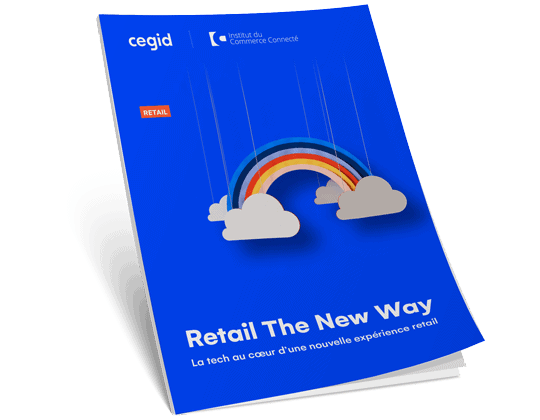Retail & Distribution
COVID-19: on the front line of retail. Interview with Cédric Ducrocq, C.E.O. of the Diamart Group – part of International Ebeltoft Group
9 April 2020

Cegid: Specialty retailers all over Europe are hoping to re-open stores in May. How optimistic is this?
Cédric Ducrocq: I live in France and almost all retailers in France have based their re-opening and organisation plans for May 11th. However, this occurs under strong sanitary conditions including limiting the number of people allowed in a store at any time, stores disinfections, temperature checks for customers, as seen in China and obligations to wear masks, etc.
Cegid: Based on measures taken in China, how do you see a gradual end to the retail lockdown in Europe?
C.D.: I don’t believe trading will go straight back to how it was before, and consumers will remain wary. The pandemic will not completely disappear in one month. I anticipate a slow and flexible lifting of selective containment measures with strict sanitary rules. The heavily regulated social distancing rules will not lift in the blink of an eye. Adjusting to a post-crisis climate will take months. Specialty retailers, which were already facing difficulties and limited cash, will not reopen all of their stores. With so little future visibility or certainty, it’s complicated for retailers to build precise strategic and business plans. Brands can make assumptions about customer reactions, behaviour and plan with imagination. Of course, brands are working on reopening plans, but these all remain extremely flexible.
Cegid: How can retailers exploit the true potential of e-commerce?
C.D.: It all depends on the level of maturity of their online business. Many specialty retailers have had to stop e-commerce as their systems are not flexible enough to expand for the demand. In addition, for many retailers, e-commerce is still a cost and not a profit, so they ceased e-commerce functions in order to save money and resources. The pandemic crisis has revealed flaws in well-established ideas. Previously, retailers considered that only full omnichannel was the best retail model, offering customers a seamless and successful integration of online and store operations. However, during this lockdown period, this has been put to test. In fact, retailers who managed their e-commerce business completely independent from stores are performing better. The crisis is disrupting ideology certainties. More than ever, retailers must have a solid strategy for omnichannel and integrated and seamless IT. All this shows how decisive agility is alongside modern supply chain and retail information systems.
Cegid: Which retail sectors will continue to suffer the most?
C.D.: For fashion retailers, it will be tough. Fashion stores may re-open in May, but with so much unsold stock on their hands from March and April collections and new season stock already in their warehouses, these chains will have monstrous inventory levels to sell. However, there is no guarantee that customers will rush into stores or instantly revert to former spending habits. We expect very aggressive price promotions that will devalue a brand reputation and market status. This will exacerbate an already chaotic fashion retail market. There are also a number of discussions about a calendar of promotions. Should retailers delay or extend sales-discount periods to move stock from already bulging warehouses? Decisions must be made very quickly because of the immediate effect on the P&L for the financial year.
Cegid: What post-crisis strategies should retailers consider?
C.D.: During May and June 2020, the priority for many will be to boost e-commerce and re-activate sales. Plans will also be in place to boost turnover for the second semester. As every business is likely to do the same, retail markets will be flooded with competitive offers. I don’t consider many positive rebound scenarios. Retailers can limit the damage from the crisis but not regain what was lost.
Cegid: Any good news: how can this crisis generate environmental opportunities?
C.D.: There is an array of opportunities for retailers. The sensitivity of consumers for sustainability will explode. Indeed, shoppers will become increasingly keen to care for the planet but with safety and health reliability. There is also a huge challenge for relocation of sourcing and supply-chains. There are critical questions about an “open world” model alongside exchange globalisation. Faced with limits and the fragility of such a model, all these aspects will be put under a microscope.
Cegid: What are the operational risks for retailers in the medium and long term?
C.D.: With such strong economic pressure to balance a P&L, the risk for retailers is to reduce omnichannel investments. However, I consider that retail’s transformation pace was already too slow prior to Covid-19 and on the contrary needs speeding up. But how can this be funded for when retailers are cutting short-term budgets to protect annual results? Turnover and margins are now under immense pressure. My message to retailers is that after the crisis they must evaluate and re-prioritise all transformational projects. Of course, it is not possible to pay for everything when money is short. However, I believe that it is a mistake to slow down digital transformation.
Cegid: At the start of 2020, what were retailers’ priorities in terms of omnichannel and Information Systems?
C.D.: It depends on the retail sector. Many companies were working on projects to unify online and offline stocks, increase customer knowledge (C.R.M.) and optimise promotional operations. Globally, specialty retailers are more advanced, with more agile and omnichannel information systems. But I find great differences, based on company size. Whilst larger specialty retailers have more advanced information systems, many small ones still have to catch up.
Cegid: In China, the pure-player JD.com launched a partnership with a major alcohol brand to organise digital parties and win sales. Can you imagine such adjustment in consumer behaviour?
C.D.: For years, the mantra of modern retail has stated how “people are the future” for physical stores. However, we are now living under rules that disrupt everything previously considered to be normal. There are currently no social gatherings, community meetings or store experiences to share. What will happen after months of invasive regulatory confinement? Will this mantra become more relevant than ever as people appreciate their need for critical human links and social interactions? However, it may be the opposite as we have entered an era of social distance and “virtual” relationships. The Chinese example shows how people are now investing large amounts of time into social networks. If this trend continues it will be a significant problem for the future success of physical retail. The post-crisis behaviour of consumers and retail working practices will have to be interpreted very carefully. All of this may have a significant impact on the essential and continual re-invention of retail.
Cegid: What else should retailers consider?
C.D.: We are in a world suffering from even more unpredictability. In this context, confidence and management of retail companies will be shaken. Retailers must adjust to be more agile, allowing for variable costs and less pre-determined expectations. Variability is the new approach and retailers will have to be even more flexible in the future.
Notes:
- During Covid-19-crisis, Cegid is maintaining business continuity
- Cegid teams, working mostly remote, from all over the world are committed to supporting retailers every day. Cegid has maintained the high quality of all our services, SaaS infrastructure, R&D, consulting and customer support etc.
- During this period, we are also offering free online learning and web-training sessions for all our retail clients and partners worldwide to accelerate tomorrow’s fast recovery.
- Finally, we have set up special recovery offers to help retailers re-start their activity in the best conditions.



